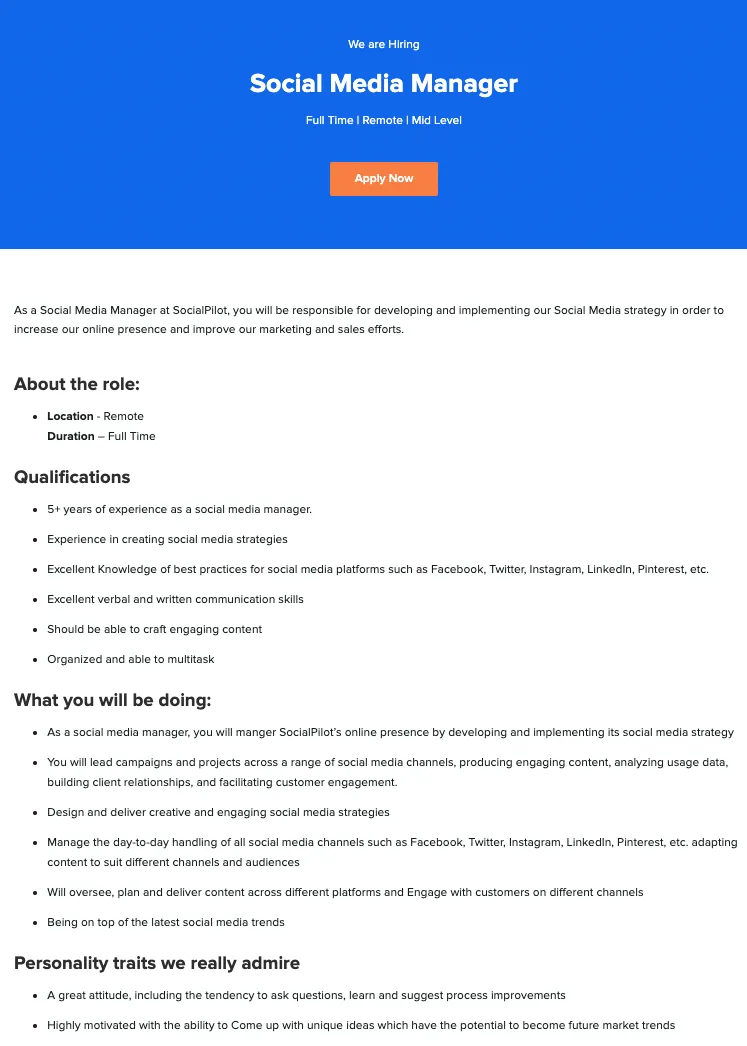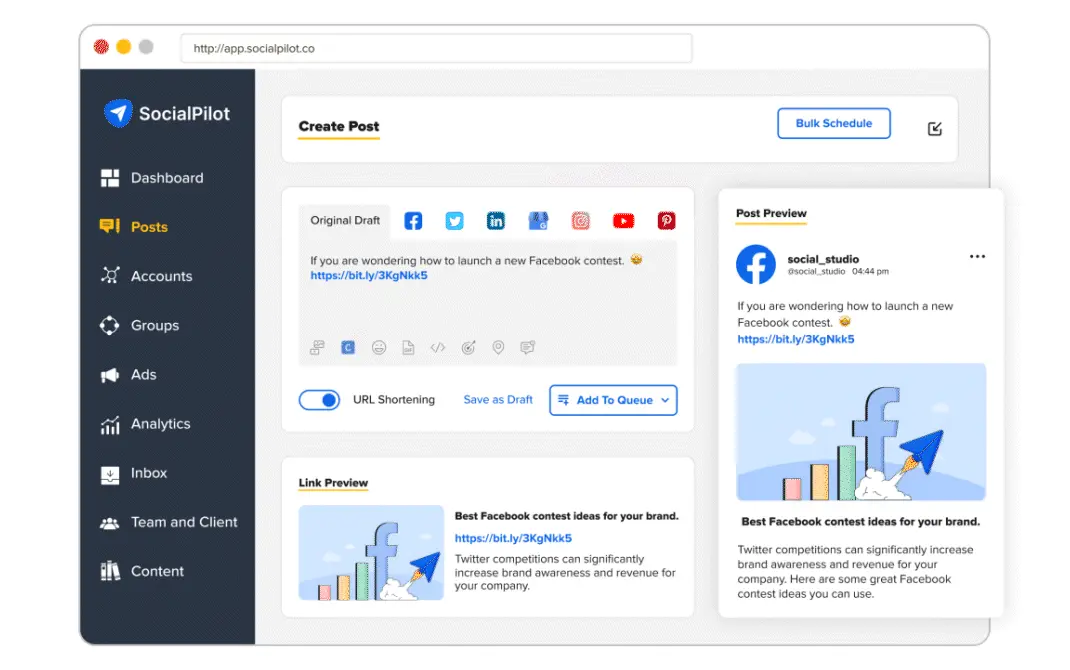In the modern and highly digitalized commercial landscape, social media isn’t just a trend—it’s a vital business tool. It’s pivotal for connecting with customers, establishing brand awareness, and driving sales.
A strong social media presence is paramount for a company’s flourishing in this digital age. However, creating and maintaining a successful social media strategy can be challenging, especially for smaller enterprises constrained by resources. This is precisely where the prowess of an adept social media manager becomes invaluable.
One of the biggest reasons why you should even consider to hire a social media manager is because it’s a strategic investment that benefits businesses, big or small. Such professionals empower companies to effectively manage their social media profiles and interact with their audience.
The contemporary business world is increasingly witnessing companies deploy social media management teams to tap potential clients and transform them into solid leads. This highlights the critical need for dedicated social media experts in our digitally-driven marketplace. So, let’s give you some tips on hiring the right social media manager.
How to Hire a Social Media Manager: 7 Effective Steps
1. Clearly Define the Role
The duties of a social media manager may be more intricate and extensive than expected, as they must align marketing efforts with the overall business plan, create a unique brand identity, and oversee multiple social media profiles.
The following are the key responsibilities of a social media manager:
- Implementing a marketing plan
- Establishing posting schedules
- Developing a brand identity
- Promoting content
- Engaging with customers
- Creating a conversion plan
- Optimizing search engines
- Analyzing data
- Creating content
These tasks require a skilled social media manager who can create a voice that stands out from competitors and connects with customers. Companies can attract the right candidate for the job by clearly understanding the role.
For instance, take the example of the global coffee chain Starbucks. Their social media manager goes beyond just posting about the latest Frappuccino.

They’re constantly working to weave a narrative encapsulating Starbucks’ commitment to quality, sustainability, and community. They engage with customers, addressing their queries, and maintaining a friendly and approachable tone. The above image is an excellent example of this.
2. Determine Your Company’s Needs
There’s no universal solution to choosing a social media manager. Your business’s unique requirements will determine the nature of the role and the person best suited to fill it. Start by considering if you need a full-time, part-time, or freelance manager and prefer to work with an individual or an agency.
Then, clarify your social media objectives and goals. Are you aiming to increase brand awareness, drive sales, or foster a sense of community? Which platforms are most relevant to your target audience? Do you need additional expertise in related areas such as email marketing, SEO, or broader digital marketing?
For example, a tech startup aiming to gain traction among young professionals might focus on LinkedIn and Twitter and require a social media manager with strong B2B marketing skills. On the other hand, a boutique clothing brand targeting millennials might prioritize Instagram and Pinterest and need a manager with a keen eye for aesthetics and influencer marketing.
Remember, social media experts often specialize in specific platforms and services, making a “jack-of-all-trades” a rare find. As such, consider engaging an agency that offers a broader range of services. Therefore, consider hiring an agency offering more extensive support and services. While budgeting is essential, remember to account for additional costs related to social media marketing, such as ad spend, influencer fees, contests, and giveaways.
3. Create a Job Description
This task serves two purposes—an essential promotional tool and a blueprint for delineating the position’s requirements. You’ll need to dive deep into your business’s needs to achieve this.
Ask yourself:
What level of experience is required? It’s not uncommon for business owners to hire interns or junior employees to handle social media to save money. However, this may not be the best approach if you cannot provide sufficient training and support. Consider hiring a more seasoned professional.
What resources are available? Social media management encompasses a myriad of tasks. Identify the most critical ones and decide which ones can be assigned elsewhere. Then, determine your key social media channels and whether you need a specialist with expertise in specific channels. Are you focusing more on Instagram’s visual storytelling, or is LinkedIn’s professional network more relevant?
For instance, a company like Red Bull, known for its high-energy content, may prioritize a social media manager with expertise in action photography and videography to manage their Instagram and YouTube channels. Just take a look below at their Instagram page.

Which social media channels to prioritize for the social media manager? It’s recommended that businesses focus on one or two channels instead of trying to excel in all of them. Since there are various areas of expertise in social media marketing, it’s essential to search for candidates with specific experience in those channels.
Also, consider if you need a specialist with proficiency in paid or organic social media—these are distinct fields requiring different skill sets.
For example, at SocialPilot, the management prioritized finding a candidate with experience in creating social media strategies and excellent knowledge of best practices for social media platforms such as Facebook, Twitter, Instagram, LinkedIn, Pinterest, etc.

4. Source Candidates
With a clear understanding of your social media goals, you’re ready to embark on the quest for your ideal social media manager. Although it may seem challenging to find the ideal candidate, know they are out there—you just need to know where to look. Here are some effective platforms to kickstart your search:
Social Media Groups
Soliciting recommendations in social media groups is an excellent way to locate potential candidates. Join industry-specific groups on platforms like Facebook and LinkedIn, and request recommendations from fellow entrepreneurs.
Find out who your peers and competitors employ as their social media managers. Alternatively, you could post on your LinkedIn personal or business page that you’re searching for a social media manager.
Job Boards
Job boards are excellent reservoirs of talent. Posting your job description on third-party career websites frequented by social media managers can yield promising results. Websites like Indeed, Glassdoor, and LinkedIn Jobs not only allow you to post vacancies but also enable you to search for potential candidates proactively.
Freelance platforms like Upwork and Freelancer are also great resources. You can expedite the hiring process by reaching out to freelancers and business owners listed there.
5. Interview Candidates
How you conduct interviews can differ significantly based on various factors such as your personal preferences, company size, etc. However, certain strategies can prove valuable in identifying the right candidates:
Consider a test assignment
At the outset of the hiring process, especially for roles that draw many applicants, a test assignment can help whittle down the pool. The same approach can be useful even if the number of applicants is smaller, as it helps evaluate their other abilities. For instance, if their application has already demonstrated their content creation prowess, you can challenge them with a strategic task like designing a weekly content calendar.
Analyze soft skills
By the time you reach the interview stage, you likely already have a good grasp of the candidate’s social media expertise and qualifications. Therefore, the interview can be a great opportunity to assess their soft skills, which are vital for success in the role. For instance, it would be beneficial to understand their ability to work collaboratively with other team members, their adaptability to the ever-evolving landscape of social media platforms, and their propensity to engage with online audiences.
Ask questions about values and culture
While larger organizations might conduct a separate values interview, smaller companies can incorporate values-related questions into the main interview. Asking about their recent efforts to improve in a specific area can provide insight into their alignment with a specific value of your company. Such questions can help identify candidates who are enthusiastic about joining your company and can easily adapt to your work culture.
6. Evaluate Candidates
A comprehensive evaluation of each candidate’s social media skills is vital when searching for the perfect social media manager. This can be achieved by assigning a diverse set of tasks that may include the creation of an all-encompassing content calendar, astute analysis of social media data, prompt response to mock customer complaints, and other such daunting yet essential endeavors.
Verifying their credentials and previous work experience is also important. This involves carefully checking their references and reviewing work samples.
Additionally, assessing the candidate’s proficiency with social media management tools, like SocialPilot, is crucial. This user-friendly platform helps streamline various social media tasks such as scheduling posts, publishing content, analyzing data, and managing multiple accounts. A candidate’s familiarity with such tools could serve as a catalyst for their success in the role.

Finally, the recruitment team should employ a methodical and impartial scoring system. This software will evaluate candidates based on a predetermined set of criteria, including but not limited to qualifications, skills, experience, and compatibility. This approach guarantees the appointment of the most suitable candidate.
7. Onboard and Train
A well-structured onboarding plan is crucial to help the new social media manager understand the company’s culture, policies, and procedures. This roadmap provides them with the necessary training on different social media platforms, software tools, and best practices and helps them navigate the company’s brand voice and expectations.
A fitting onboarding plan entails introducing the company’s mission, values, and objectives. It also includes understanding the brand’s voice and tone and the intended target audience. The new manager must know the company’s social media policies and procedures. This knowledge assists them in responding appropriately to sensitive issues, handling negative comments, and reporting problems.
Moreover, the onboarding plan should include intensive training on social media platforms like Facebook, Twitter, Instagram, LinkedIn, and the necessary software tools. The new manager should be well-versed in creating engaging content, interacting with followers, measuring success, and staying on top of the latest trends and developments in social media.
Proper training ensures the social media manager has the skills and knowledge to represent the brand effectively. Their understanding of your brand will help them achieve goals and avoid mistakes that could tarnish the company’s reputation.
Conclusion
Hiring a social media manager can be transformative for any business seeking to enhance its online presence. Using data-driven strategies, the right candidate can help maintain a consistent brand tone, post engaging content, and track performance.
However, it is vital to carefully define the job requirements, conduct thorough interviews, and provide proper training and support to ensure a successful partnership. By following these steps, businesses can hire a social media manager to take their online presence to the next level.



